
- Все
- Детская и образовательная литература
- Детская художественная литература
- Современная детская литература
Бесплатный фрагмент - Fairy Tales for Fun and Wisdom
Посвящается моей бабушке
Предисловие автора
Когда я был совсем маленьким, лет пяти, бабушка решила научить меня французскому языку, который знала и любила, потому что никогда не ходила в школу, а учила его дома, от гувернанток, и начала читать мне французские сказки. Как сейчас помню замечательные, добрые и весёлые истории про козлёнка Рудуду и медвежонка Рикики. На дворе было начало 1970-х годов, и продавались эти истории в виде маленьких журнальчиков в единственном тогда в Москве магазине иностранной книги.
Шли годы. Детская память — отличная вещь. Особенно когда она не забита лишними датами, правилами и формулами. Поэтому многие тогдашние французские слова и выражения — вместе с произношением — врезались в неё намертво. Больше я французский никогда и нигде специально не учил, однако впоследствии всегда чувствовал себя во Франции уверенно и даже вступал с французами, которые далеко не все хорошо знают английский язык, в смелые беседы. Я даже не замечал, как Рикики и Рудуду то и дело протягивают мне руку помощи.
Именно поэтому сегодня мне захотелось направить тем же путём моих маленьких и наверняка любознательных читателей, подарив им книжку английских сказок и ярких картинок, в которой бы развлеченье и открытие мира английского языка совмещалось с дружескими поученьями.
Читайте, запоминайте, мудрейте и будьте здоровы!
The Nightingale and the Hidden Spring (Соловей и скрытый источник)
In the mountains of Greece, a nightingale sang every evening by a dry well. The villagers wondered why it sang, as the well hadn’t held water in years.
One day, a young girl named Eleni asked the bird, “Why do you sing here?”
The nightingale replied, “This well once gave life to your village. If you listen closely, it still whispers of water.”
Eleni gathered the villagers, and together they dug deeper into the well. At last, a fresh spring bubbled forth, bringing water back to the village.
The nightingale’s song became a symbol of hope, reminding the villagers that even forgotten things can hold life.
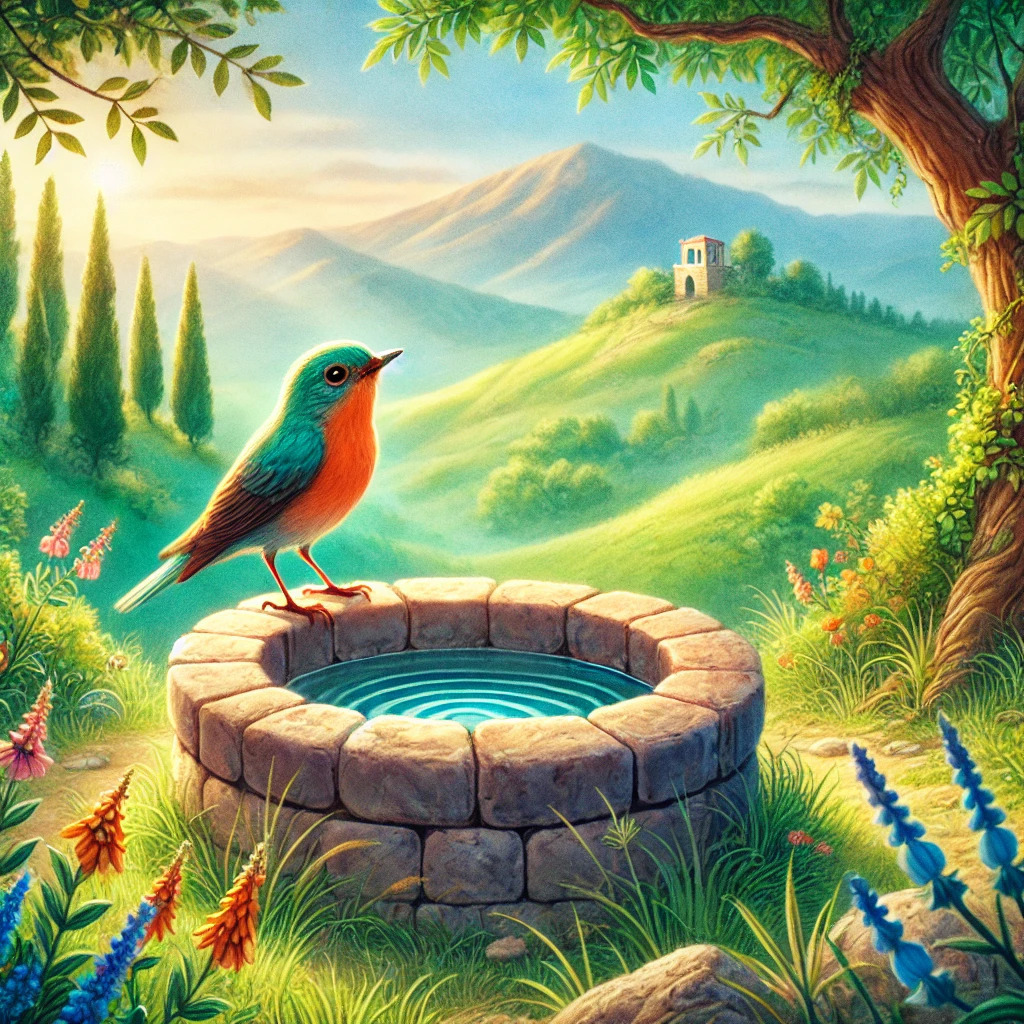
Moral:
Patience and persistence can uncover hidden treasures.
Notes:
— Nightingale — a bird known for its beautiful song (соловей).
— Whispers — soft speaking sounds (шёпоты).
— Persistence — continuing to try despite difficulty (настойчивость).
— Uncover — to reveal something hidden (обнаружить).
The Wise Turtle and the Hasty Rabbit (Мудрая черепаха и торопливый кролик)
Once, in a green forest, a rabbit and a turtle argued about who was the fastest animal. The rabbit laughed loudly, “Turtle, you are so slow! You can’t even dream of beating me in a race.”
The turtle smiled and said, “Let’s see if wisdom can beat speed. I challenge you to a race!”
The next morning, all the animals gathered to watch. The rabbit ran quickly and was soon far ahead. He thought, “The turtle is so slow; I can take a nap and still win!”
While the rabbit slept under a tree, the turtle kept moving, step by step, slowly but steadily. When the rabbit woke up, he saw the turtle near the finish line! He ran as fast as he could, but it was too late. The turtle won the race.
The rabbit hung his head in shame and said, “I learned my lesson. I won’t underestimate others again.”
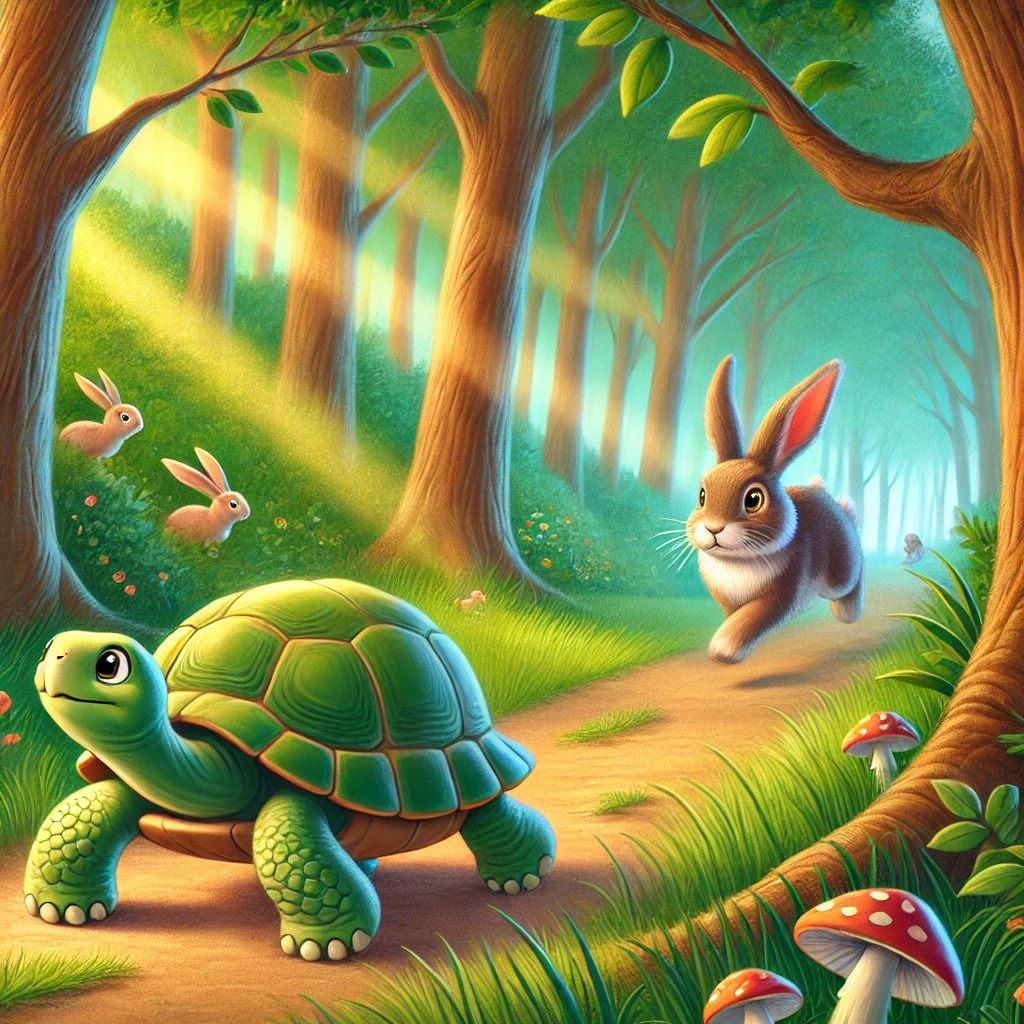
Moral:
Slow and steady wins the race.
Notes:
— Argued — to talk angrily with someone when you disagree (ссориться, спорить).
— Challenge — to invite someone to compete or fight (бросать вызов).
— Steadily — moving in a regular and continuous way (неуклонно, устойчиво).
— Underestimate — to think someone is less capable than they really are (недооценивать).
The Lion and the Clever Mouse (Лев и хитрая мышка)
One sunny day, a lion was sleeping under a big tree. Suddenly, a little mouse ran across his paw. The lion woke up angrily and caught the mouse with his strong claws.
The mouse squeaked, “Please don’t eat me, Mr. Lion! One day, I will help you in return.”
The lion laughed. “How can a tiny mouse like you help the king of the jungle?” But he let the mouse go.
A week later, the lion was caught in a hunter’s net. He roared for help, but no one came. The mouse heard the lion’s roar and ran to him. “Don’t worry, Mr. Lion, I’ll save you!”
The mouse used her sharp teeth to chew the ropes of the net. Soon, the lion was free. He smiled and said, “Thank you, little mouse. I will never judge someone by their size again.”
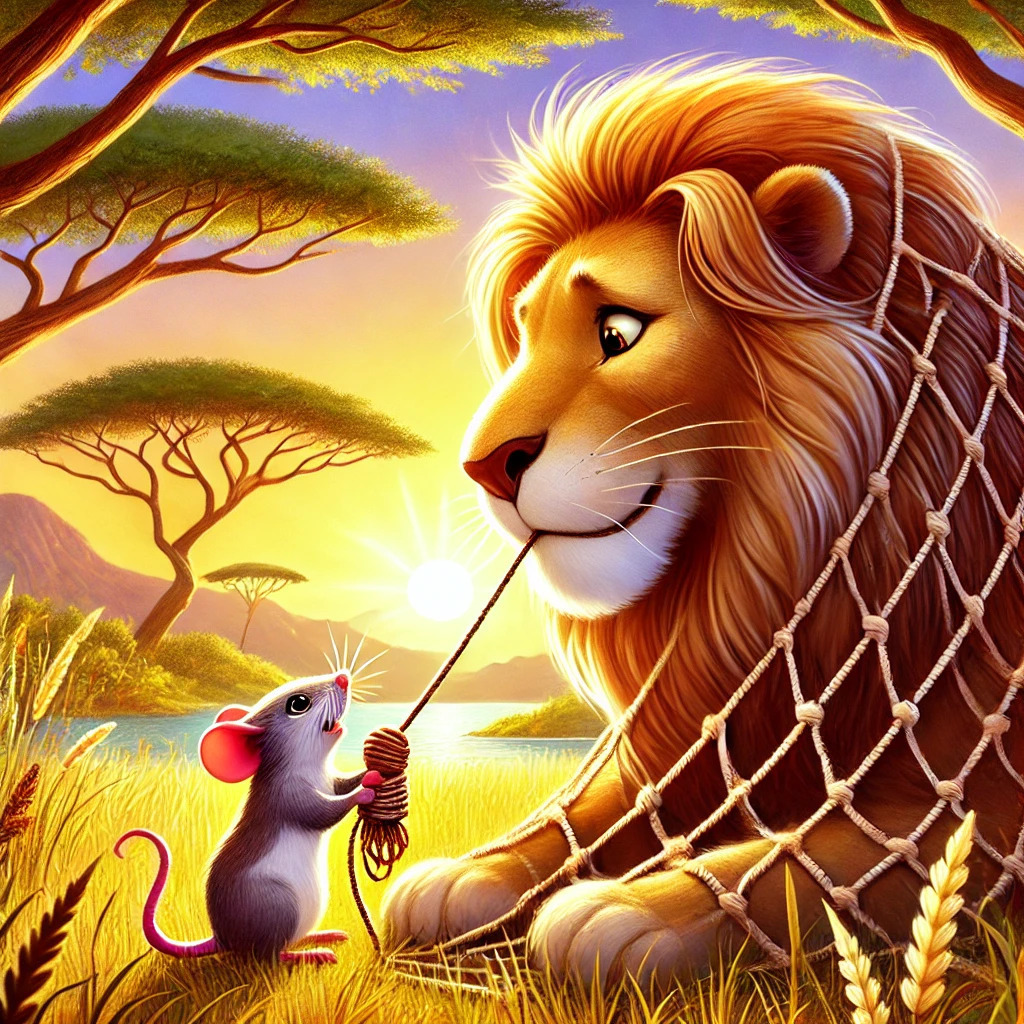
Moral:
Even the smallest friend can make a big difference.
Notes:
— Claws — the sharp nails of an animal (когти).
— Squeaked — made a high, quick sound (пронзительно пискнул).
— Hunter’s net — a trap made of ropes used to catch animals (охотничья сеть).
— Chew — to bite something repeatedly (грызть, жевать).
The Ant and the Lazy Grasshopper (Муравей и ленивый кузнечик)
In a sunny meadow, ants worked hard to collect food for winter. A grasshopper played his violin and laughed. “Why are you working so hard? There’s plenty of time before winter!”
An ant replied, “We are preparing for the cold days ahead. You should, too.”
The grasshopper laughed louder, “Winter is far away. I want to sing and dance now!”
When winter came, the grasshopper had no food. He knocked on the ants’ door, shivering. “Please, can you share some food?”
The ants shared their food but said, “Next time, remember: hard work today saves you tomorrow.”
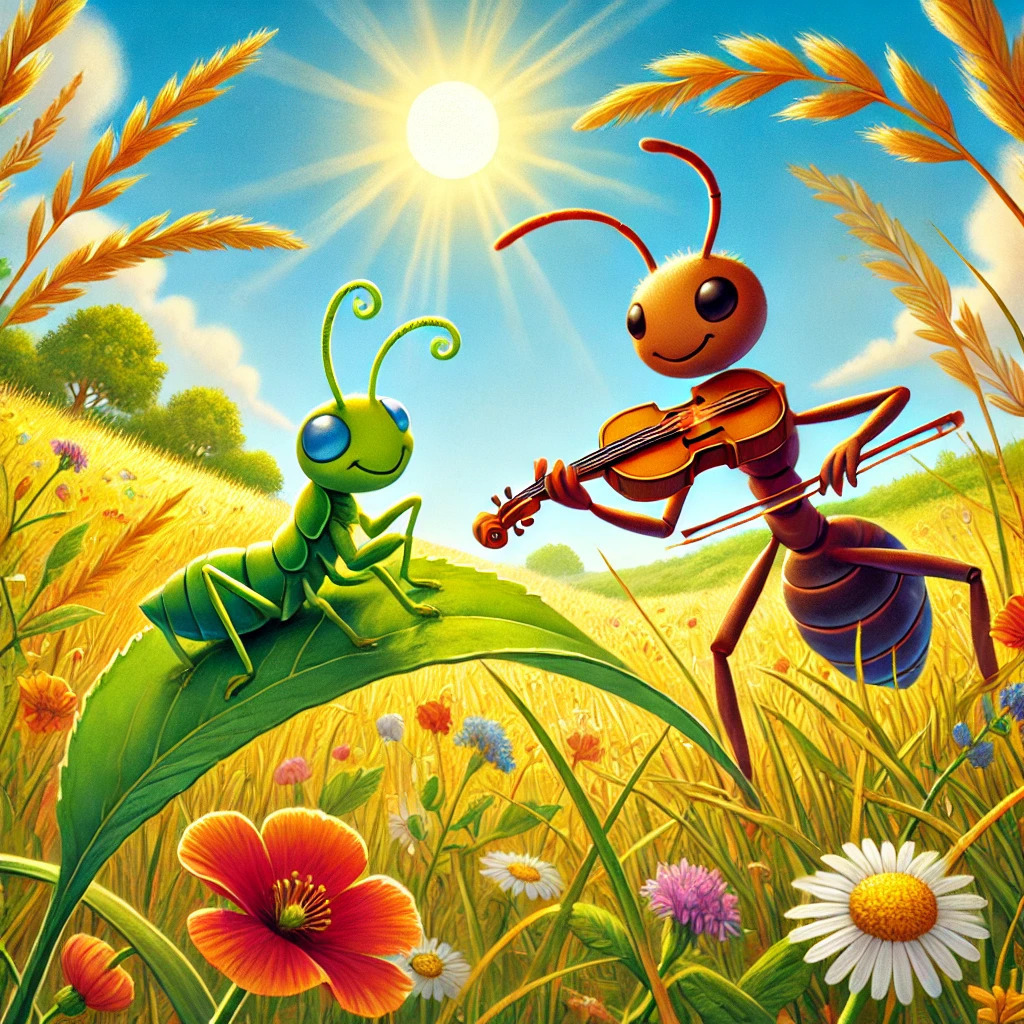
Moral:
Plan ahead and work hard.
Notes:
— Meadow — a grassy field with flowers (луг).
— Violin — a musical instrument (скрипка).
— Shivering — shaking because of cold (дрожать от холода).
— Knocked — hit a door to ask to come in (постучал).
The Talking Shadow (Говорящая тень)
Once, in a quiet village by the sea, a boy named Mali loved chasing his shadow. He’d run, jump, and wave, watching it copy his every move.
One day, as the sun set and the world turned golden, Mali noticed his shadow acting strangely. Instead of following him, it began pointing toward the forest.
Mali stopped. “What do you want, shadow?” he asked.
To his surprise, the shadow spoke. “There’s danger in the forest. Someone needs your help.”
Mali was frightened but curious. He followed the direction of the shadow’s pointing arm. In the forest, he found an old woman trapped under a fallen branch.
“Please, help me,” she whispered weakly.
Mali used all his strength to lift the branch, freeing the woman. She smiled and said, “Your courage and your shadow saved me. Never ignore what your heart — or your shadow — tells you.”
As Mali walked back, he looked at his shadow and smiled. It was back to following him silently.
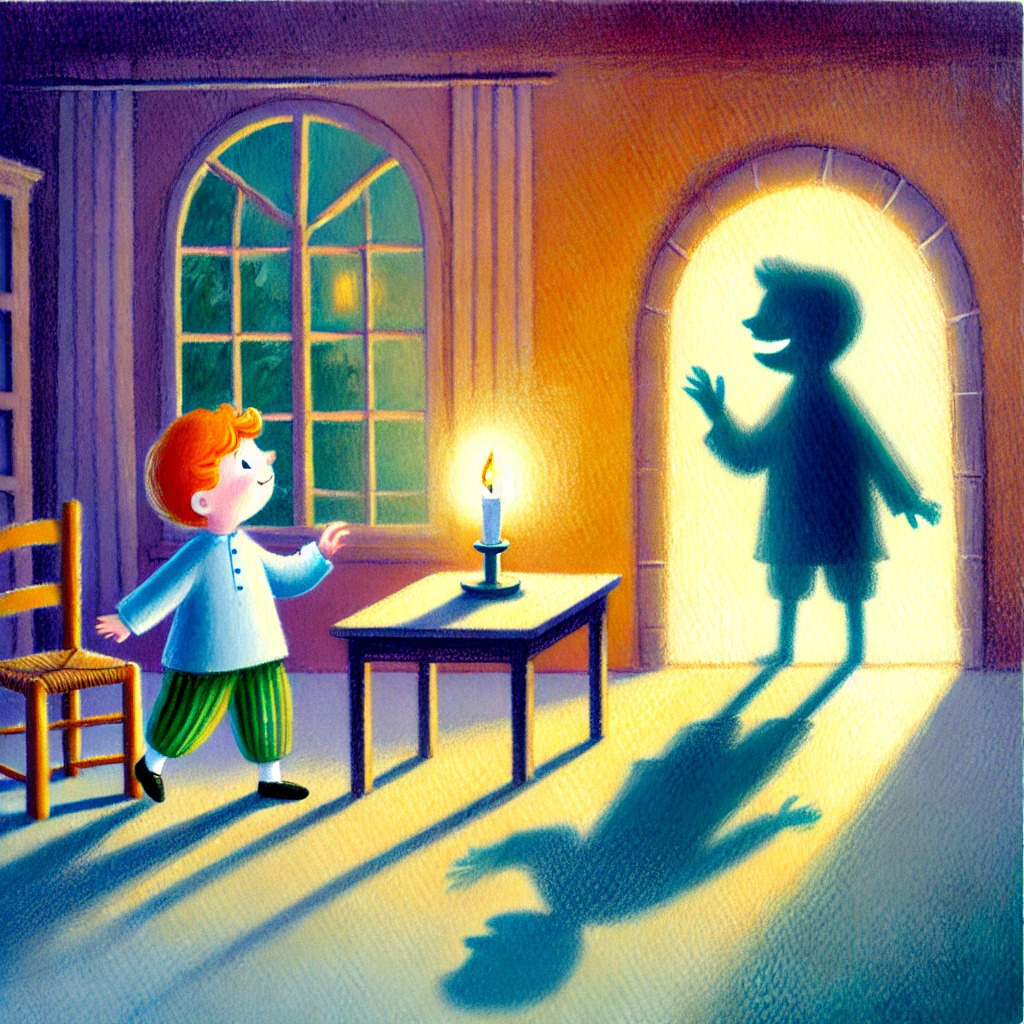
Moral:
Listen to the quiet signs; they often lead to the right path.
Notes:
— Copy — to do the same as someone else (копировать, повторять).
— Golden — having the color of gold, like the light at sunset (золотистый).
— Curious — wanting to know or learn something (любопытный).
— Frightened — feeling scared or afraid (испуганный).
The Bird Who Forgot to Sing (Птица, которая забыла спеть)
High in the mountains of Kisiwa, there lived a bird named Nyota. She was known for her beautiful songs that made flowers bloom faster and rivers flow smoother.
One year, during the dry season, Nyota stopped singing. The flowers drooped, and the rivers slowed to a trickle. “Why aren’t you singing?” asked the wind.
“I don’t feel like it,” Nyota replied. “What’s the point? The world is too dry and sad.”
The wind sighed and carried her words far and wide. Soon, a group of children climbed the mountain with buckets of water. They watered the flowers and sang songs as they worked.
Nyota watched, her heart stirring. Their songs were clumsy but filled with hope. She opened her beak and joined them, her voice blending with theirs.
The flowers perked up, the rivers flowed again, and the children cheered.
Nyota realized, “Even when the world feels dry, one song can bring life back.”

Moral:
When you share your gift, you inspire others to act.
Notes:
— Drooped — hung down weakly (поникли, свисали).
— Trickle — a small, slow flow of water (струйка).
— Clumsy — not graceful or skilled (неловкий).
— Perked up — became lively or active again (ожили).
The Tree Who Chose to Move (Дерево, которое решило двигаться)
In the middle of the great plains, there stood a lonely baobab tree. It was strong, with roots that reached deep into the earth. But the baobab was sad.
“I want to see the ocean,” it whispered to the wind one day.
The wind laughed. “Trees don’t move!”
But the baobab refused to give up. Each day, it stretched its roots a little farther, pulling itself inch by inch across the plains.
The animals laughed. “You’ll never make it,” they said.
Years passed, and the baobab didn’t stop. Finally, its roots touched sand, and it saw the ocean. Waves crashed and sparkled under the sun. The baobab stood tall and proud, its leaves rustling in joy.
The wind returned and said, “I doubted you, but you’ve taught me: even what seems impossible is possible with patience.”
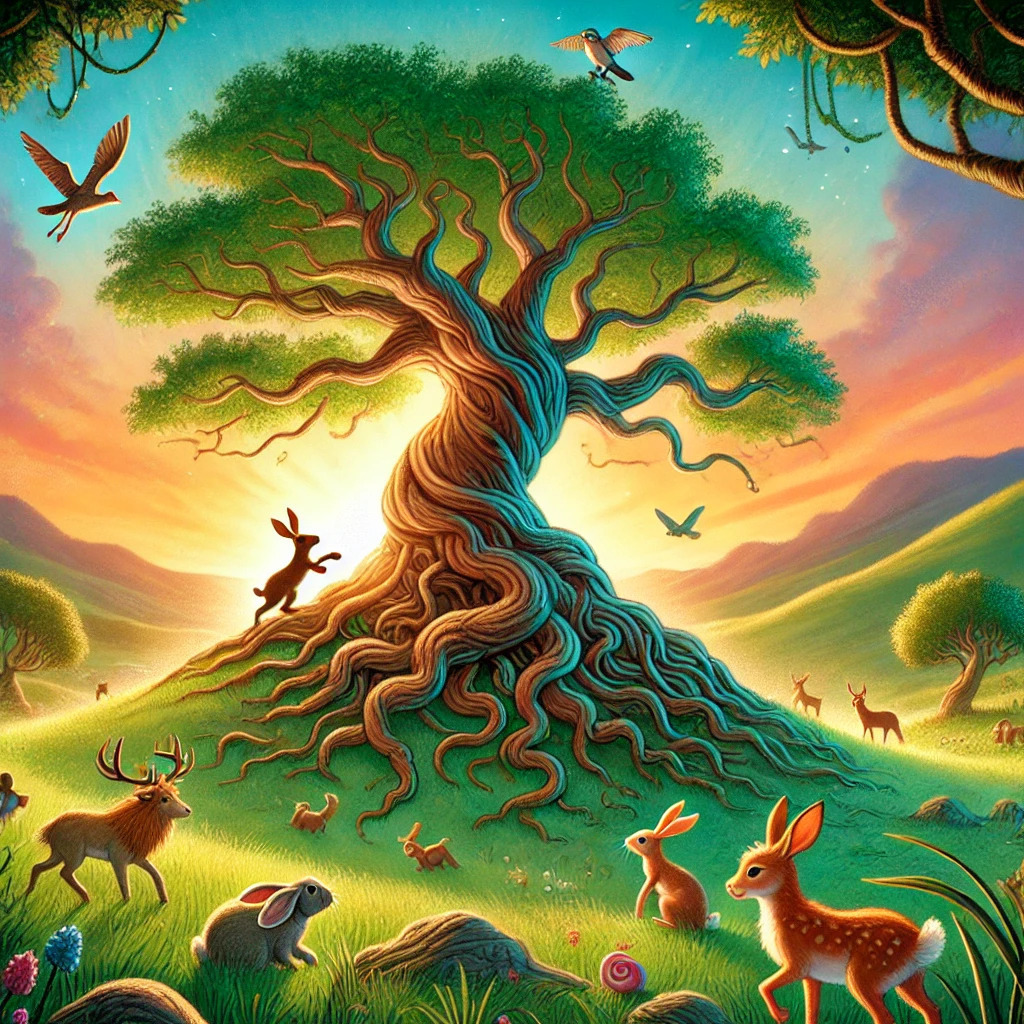
Moral:
With patience and determination, you can achieve the impossible.
Notes:
— Lonely — feeling sad because you are alone (одинокий).
— Whispered — spoke very quietly (прошептал).
— Inch by inch — little by little, slowly (шаг за шагом).
— Doubted — didn’t believe something could happen (сомневался).
The Birch That Hid the Stars (Берёза, которая спрятала звёзды)
Deep in a Russian forest, there stood a tall birch tree named Alyona. She was proud of her silvery bark and graceful branches. At night, the stars danced above her, reflecting in the quiet lake nearby.
One evening, Alyona noticed something strange. A shadow crept over the lake, and the stars disappeared one by one. Alarmed, she whispered to the wind, “Where are the stars going?”
The wind answered, “A greedy crow is stealing them and hiding them in his nest.”
Alyona couldn’t stand to see the sky empty. She stretched her branches higher and higher until they touched the clouds. She gathered the stars one by one and held them tightly in her leaves.
The crow squawked angrily, “Give them back! They are mine!”
Alyona replied, “The stars don’t belong to you or me. They belong to everyone.” She gently threw the stars back into the sky, where they began to shine again.
That night, the forest animals gathered under Alyona’s branches and thanked her. She stood taller than ever, her leaves glowing faintly, as if kissed by starlight.
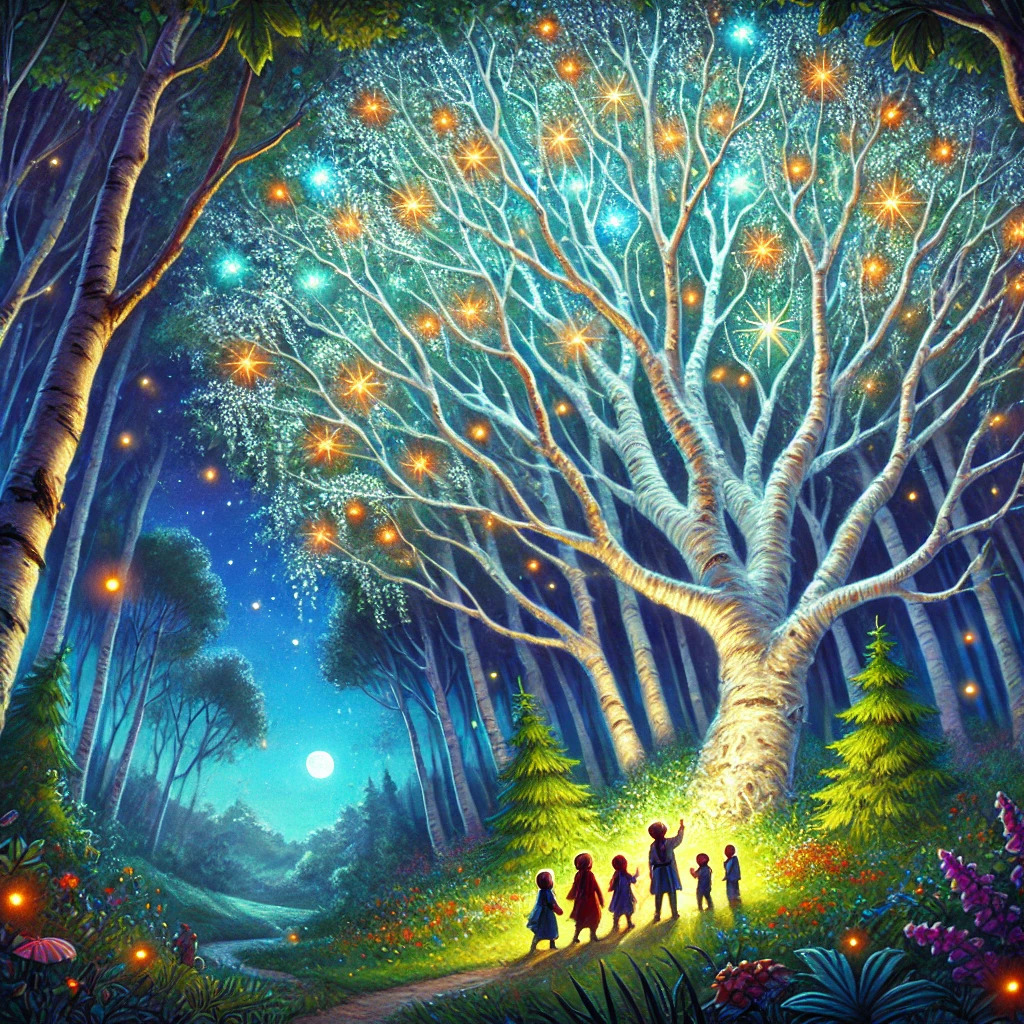
Moral:
What belongs to everyone must be protected by each of us.
Notes:
— Silvery — shiny and gray, like silver (серебристый).
— Graceful — elegant and beautiful (изящный).
— Alarmed — worried or frightened (тревожный).
— Greedy — wanting too much of something (жадный).
The Snowflake That Refused to Melt (Снежинка, которая отказалась таять)
One winter in Siberia, a snowflake named Polina fell from the sky. She was tiny but perfect, with sharp, sparkling edges.
As she landed on a boy’s mitten, she overheard him say, “I wish winter could last forever.”
Polina decided she would grant his wish. “I won’t melt,” she thought. “I’ll stay frozen forever!”
The boy carried Polina into his warm house. She felt the heat but refused to change. She clung to the mitten, determined to remain a snowflake.
Day by day, Polina grew tired. She missed the sky and the cold wind. She whispered, “Maybe it’s okay to let go.”
The next morning, as sunlight streamed through the window, Polina melted. Her water seeped into a potted plant on the windowsill.
Spring came, and a flower bloomed in that very pot. The boy smiled and said, “Even winter leaves gifts behind.”
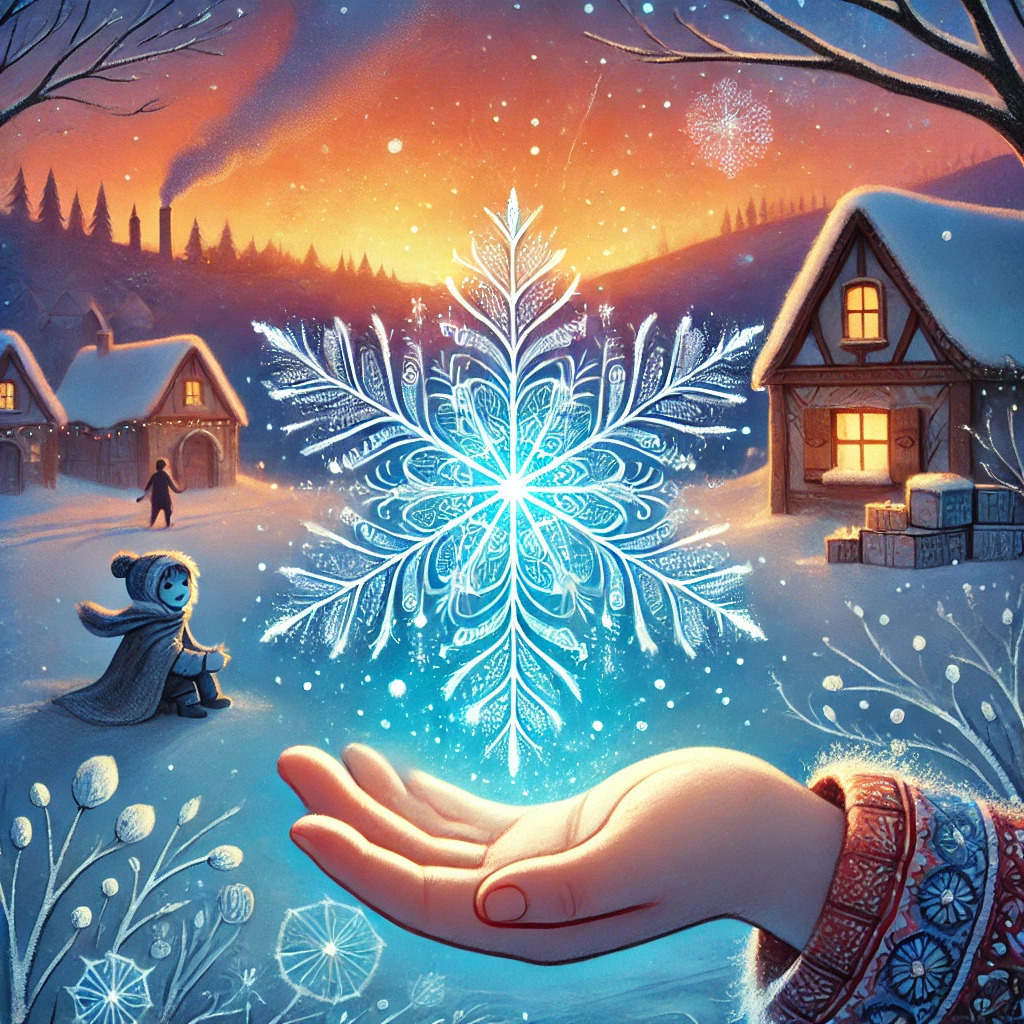
Moral:
Letting go can lead to something beautiful.
Notes:
— Sparkling — shining brightly (искрящийся).
— Mitten — a warm glove with one part for the thumb (варежка).
— Grant — to give or fulfill a wish (исполнять).
— Seeped — flowed slowly through small holes (просочилась).
The Fox and the Frozen Lake (Лиса и замёрзшее озеро)
One frosty morning in a quiet Russian village, a fox named Zorya tiptoed across a frozen lake, her paws clicking softly on the ice. She was searching for fish under the ice to feed her cubs.
Suddenly, she heard a loud crack! The ice beneath her feet began to split. Zorya froze, unsure what to do.
A raven flying above cawed, “Run, fox, run! The ice will swallow you!”
But Zorya didn’t move. She whispered to the lake, “I trust you. You wouldn’t let me drown.”
The lake, flattered by her words, steadied its surface. Zorya carefully backed away to solid ground.
That evening, the fox gathered her cubs by the lakeshore and taught them an important lesson: “Panic breaks the ice, but calm keeps you afloat.”
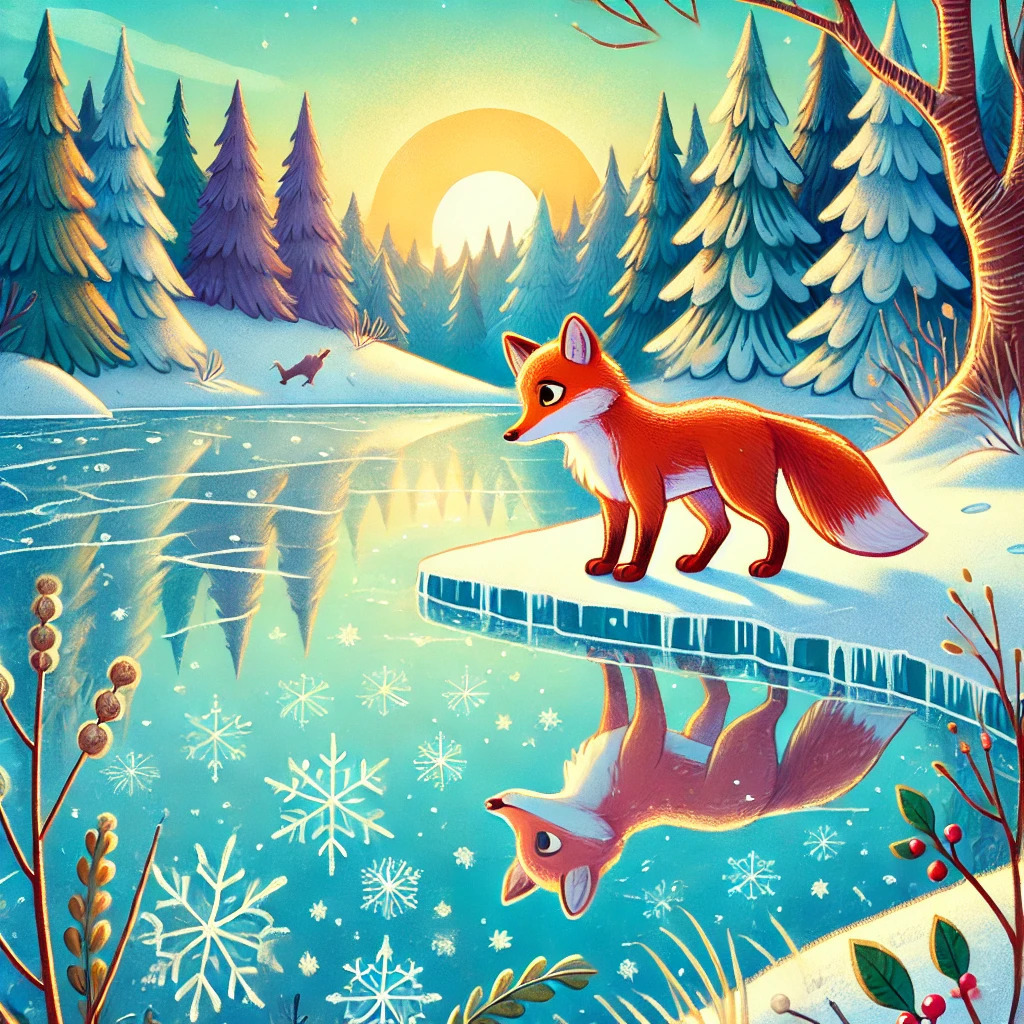
Moral:
Stay calm in the face of danger, and you’ll find your way to safety.
Notes:
— Tiptoed — walked quietly on the tips of the toes (шагала на цыпочках).
— Split — broke apart (раскололся).
— Flattered — pleased by praise (польщённый).
— Afloat — staying on the surface, not sinking (на плаву).
The Bell That Rang in the Fog (Колокол, который звонил в тумане)
In a small Russian village surrounded by misty hills, there stood an old bell tower. The bell, named Darya, hadn’t rung in years because no one climbed the creaky stairs anymore.
One autumn evening, a thick fog rolled in, covering the entire village. Travelers on the nearby road lost their way, stumbling blindly through the haze.
“Where is the village?” a man cried. “We need help!”
Darya heard the voices through the still air and thought, If only someone could ring me, I could guide them.
Summoning all her strength, Darya shook herself. At first, only a faint chime escaped, but she didn’t stop. She rang louder and louder until her clear tone pierced the fog.
The travelers followed the sound and arrived safely at the village. The villagers, hearing Darya’s call, rushed to greet them with warm blankets and hot tea.
From that day on, the villagers took care of Darya, climbing the stairs to polish her and make sure she would never fall silent again.
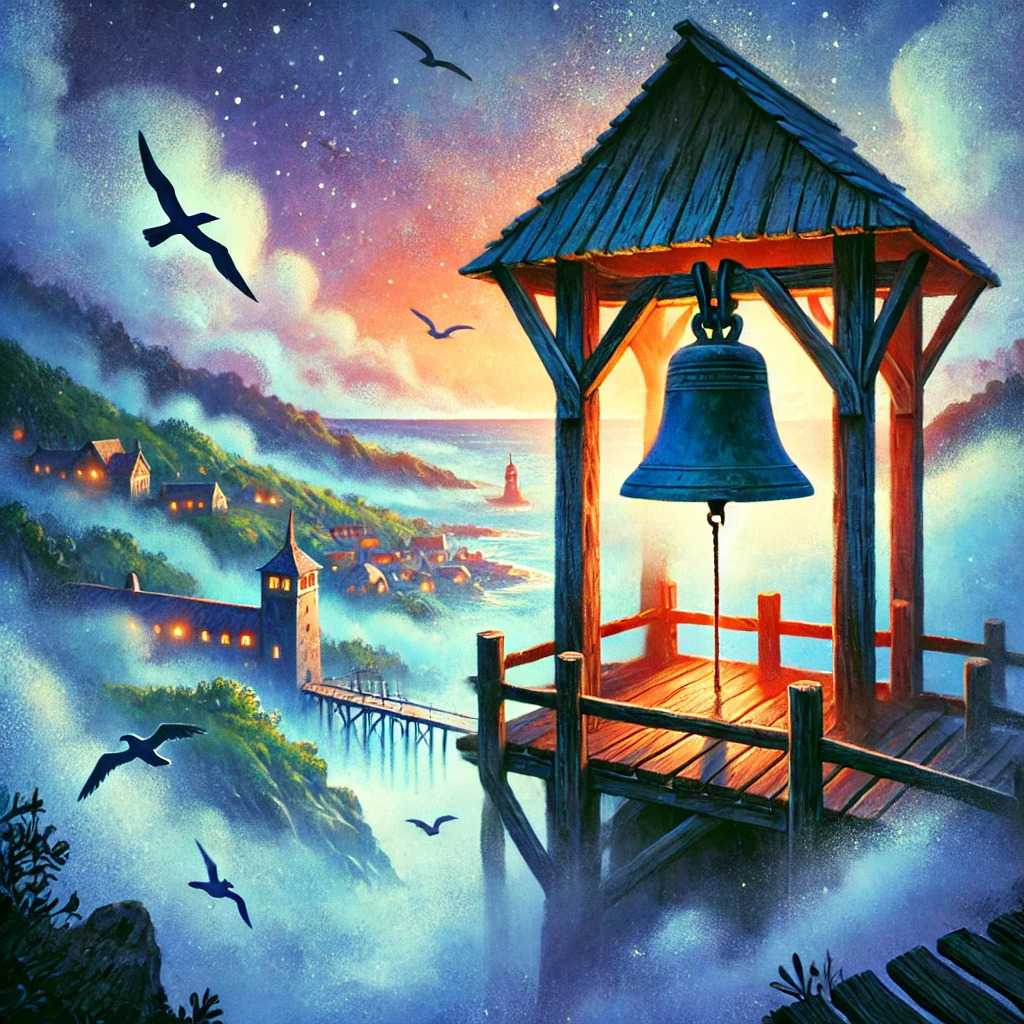
Moral:
Even forgotten voices can save lives.
Notes:
— Misty — filled with fog (туманный).
— Haze — a thin mist or fog (дымка, мгла).
— Chime — a clear ringing sound (перезвон).
— Pierced — broke through something (пронзил).
The Hedgehog Who Lost His Needles (Ёжик, который потерял иголки)
In a quiet birch grove near a river, there lived a hedgehog named Pyotr. His sharp needles made him feel safe from any danger. But one day, after an unusually strong storm, Pyotr woke up to find his needles scattered all over the ground.
Panicked, he rolled into a ball, but without his needles, he felt exposed and helpless. “What will I do now?” he thought.
His friends, a squirrel and a sparrow, came to help. “Let’s find something to replace your needles!” they said. The squirrel brought pine needles, and the sparrow found feathers. Pyotr stuck them to his back, but they kept falling off.
Finally, an old owl perched nearby said, “You don’t need to hide, Pyotr. Try trusting others for once.”
Pyotr hesitated but decided to walk through the forest without his needles. To his surprise, no one attacked him. His friends stayed by his side, protecting him.
As spring arrived, Pyotr’s needles grew back, but he had learned an important lesson: strength isn’t just about what you carry on your back.
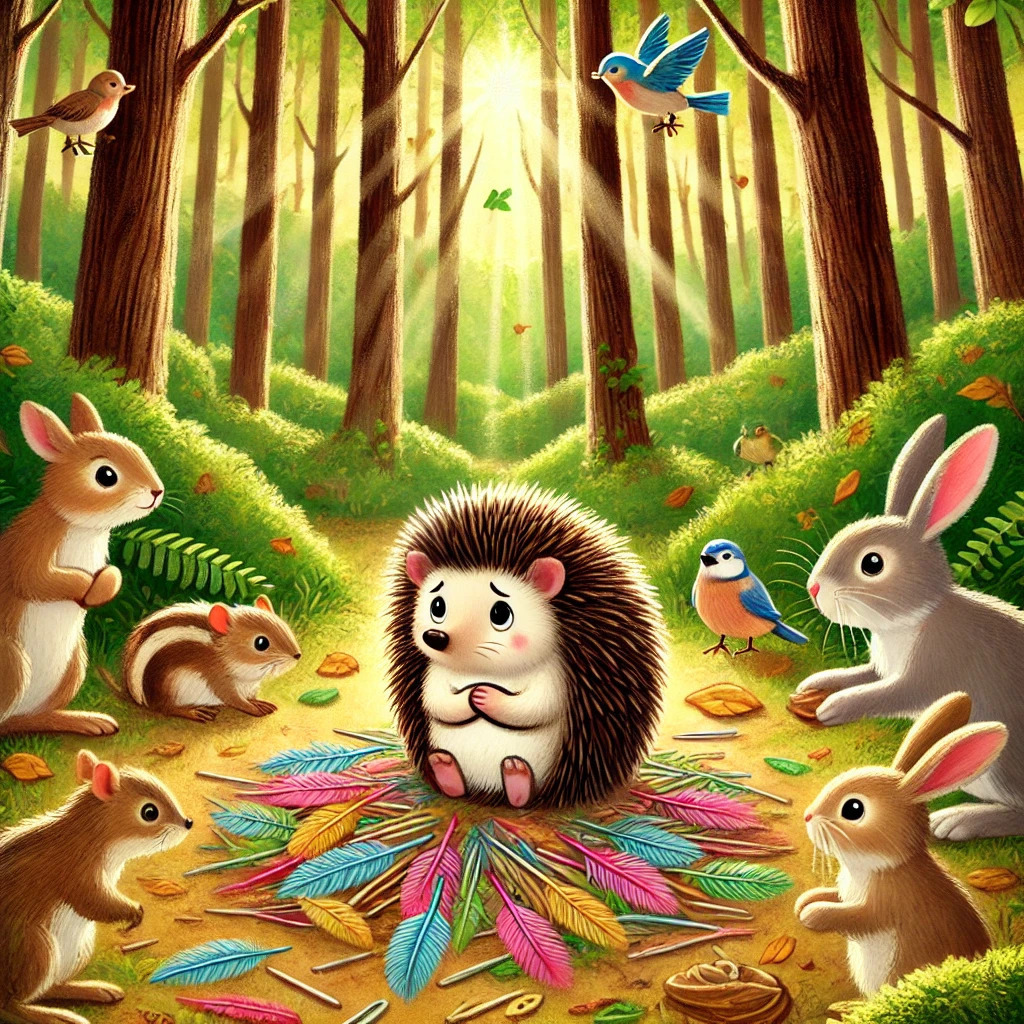
Moral:
True strength lies in trust and friendship.
Notes:
— Needles — sharp spikes on a hedgehog’s back (иголки).
— Exposed — without protection (уязвимый).
— Replace — to put something new in place of something else (заменить).
— Hesitated — paused before making a decision (колебался).
The Moonlight Fox and the Frozen River (Лиса-луна и замёрзшая река)
On the outskirts of a snowy Russian village, people whispered about a magical fox with a silvery coat that shimmered like moonlight. She was called Luna.
One harsh winter, the river froze solid, cutting the villagers off from the other side where food and firewood lay stored. Desperate, they called out, “Who will cross the ice for us?”
Luna appeared that night, her coat glowing under the moon. “I will guide you,” she said, her voice soft as snow.
The villagers followed her carefully as she traced a safe path across the ice. They moved slowly, but Luna’s tail brushed the surface, revealing cracks they couldn’t see.
By dawn, everyone was safely across, and the villagers cheered, thanking Luna. She bowed her head and disappeared into the forest, leaving behind only her glowing pawprints in the snow.

Moral:
True leaders guide others safely, even through the darkest nights.
Notes:
— Shimmered — sparkled or shone faintly (мерцала).
— Outskirts — the outer edge of a village or town (окраина).
— Trace — to mark or follow a path (прокладывать).
— Pawprints — marks left by an animal’s paws (следы лап).
The Willow That Caught the Storm (Ива, которая поймала бурю)
In a small Russian village by the river, there grew an old willow tree. Her branches bent low, almost touching the ground, and she whispered secrets to the children who played beneath her.
One summer evening, the sky darkened, and a fierce storm rolled in. The wind howled, lightning flashed, and the villagers ran inside their homes, frightened.
The willow, seeing the storm’s fury, called out, “Come closer, and I will protect you!”
A family of sparrows fluttered into her branches, followed by a rabbit and her young, then a pair of fox cubs. The willow bent her branches even lower, creating a shelter.
The storm raged, but the willow held firm, her roots gripping the earth. The animals huddled together, safe under her canopy.
When the storm passed, the willow stood tall again, though some of her leaves were torn away. The sparrows chirped, “Thank you, Willow. Without you, we wouldn’t have survived.”
The willow swayed gently and replied, “Sometimes, we must bend so others won’t break.”
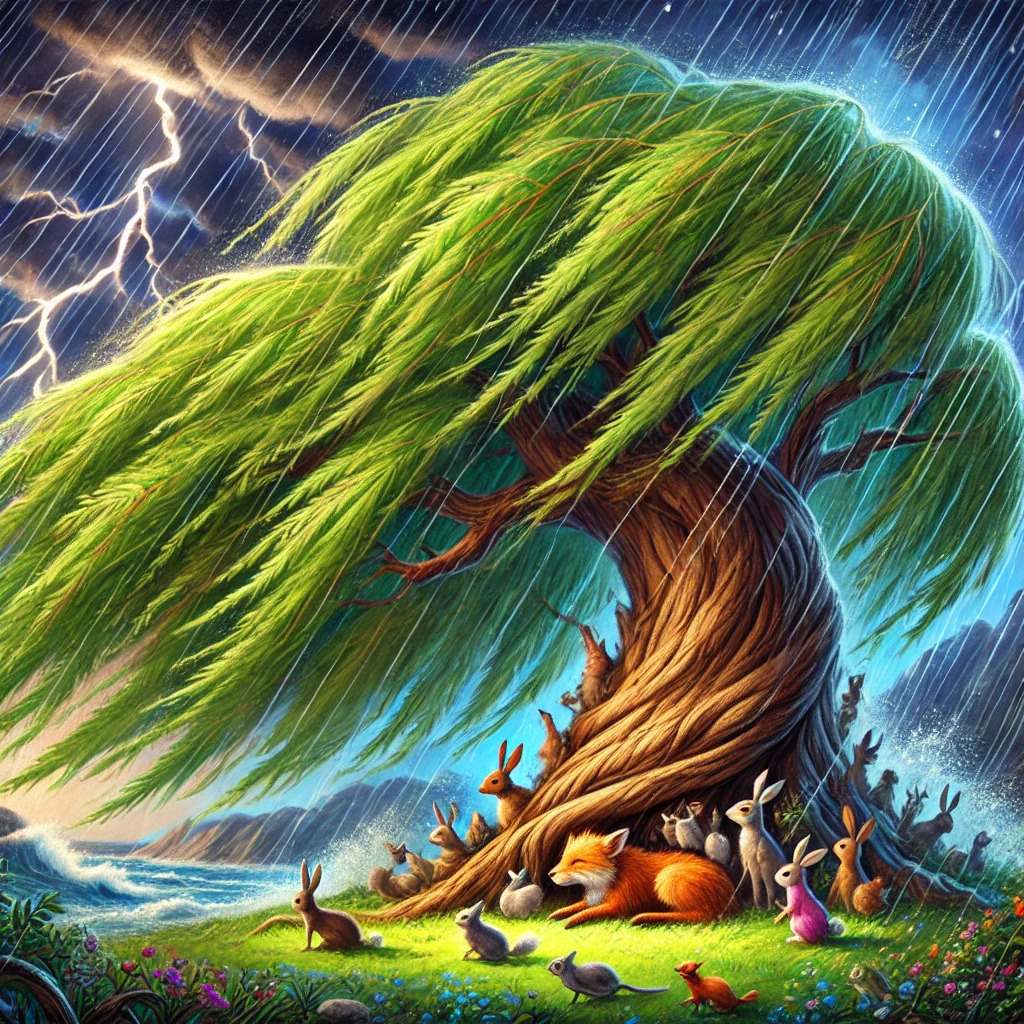
Moral:
True strength is in protecting others, even if it costs you something.
Notes:
— Fierce — very strong or violent (яростный).
— Howled — made a loud, long sound, like the wind or wolves (завыл).
— Huddled — stayed close together for warmth or safety (сбились в кучу).
— Canopy — a covering, like the top of a tree (крона).
The Frog Who Wanted to Fly (Лягушка, которая хотела летать)
Near a calm Russian pond, there lived a frog named Tosha. He was happy hopping from lily pad to lily pad, but deep down, he dreamed of flying like the swallows above.
One day, Tosha told his friend the heron about his dream. The heron laughed, “Frogs don’t fly, Tosha. That’s just how it is.”
But Tosha didn’t give up. He began jumping higher and higher, practicing every day. The other frogs teased him. “You’re wasting your time!” they croaked.
One morning, as the heron flew over the pond, Tosha called out, “Take me with you!” Amused, the heron grabbed Tosha gently in her beak and soared into the sky.
Tosha looked down at the pond far below and gasped, “It’s so beautiful up here!”
When the heron brought him back, Tosha told the other frogs, “I may not have wings, but I’ve seen the sky. And now I know — dreams are worth chasing, even if others don’t believe in them.”
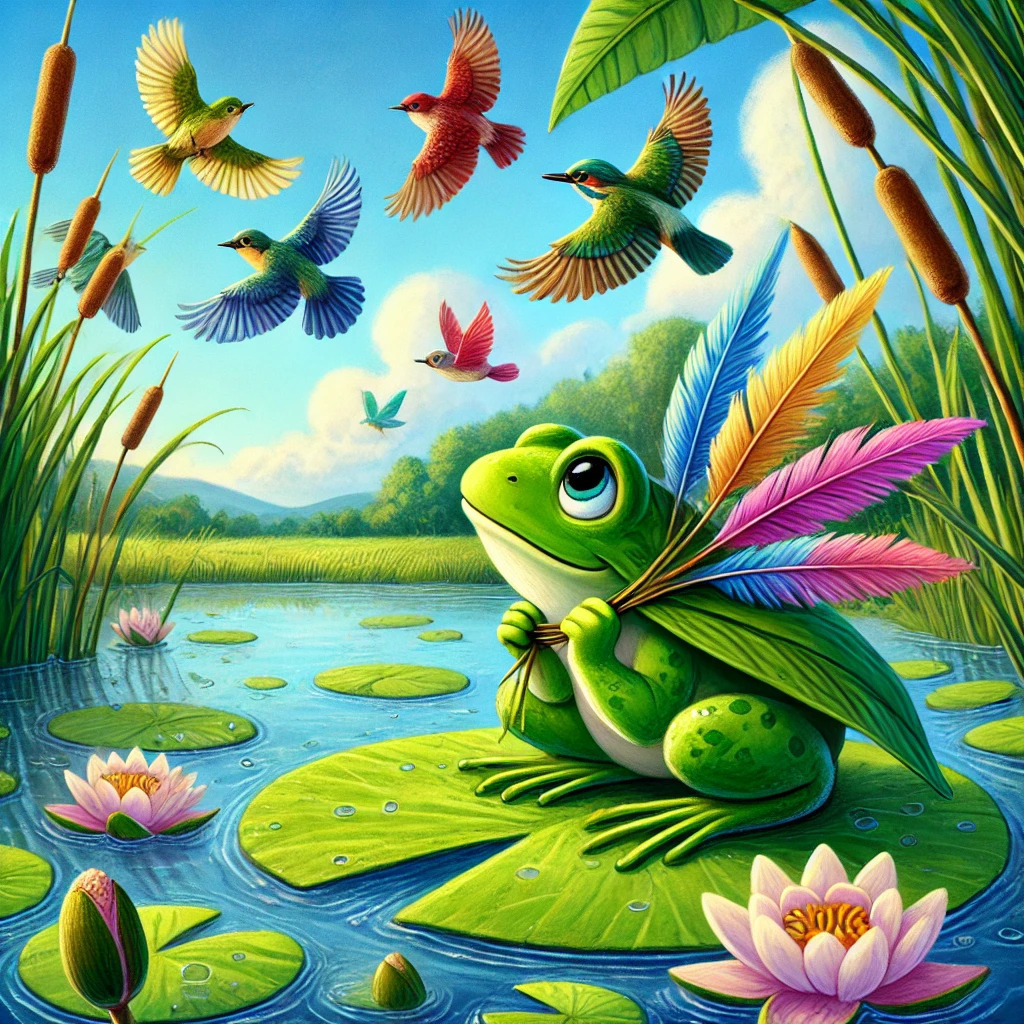
Moral:
Dare to dream, even if it seems impossible.
Notes:
— Hopping — jumping on one leg or with small jumps (прыгать).
— Lily pad — a flat, round leaf that floats on water (кувшинка).
— Teased — made fun of someone in a playful or mean way (дразнили).
— Soared — flew high in the sky (взмыл в небо).
The Candle That Refused to Go Out (Свеча, которая отказалась гаснуть)
In a snowy village near the Ural Mountains, an old woman named Babushka lit a candle every evening. She told her grandchildren, “This candle keeps the dark spirits away. Never let it go out.”
One stormy night, the wind blew fiercely, shaking the walls of their wooden house. The candle flickered but stayed lit.
Suddenly, a shadow crept into the room. It whispered, “Blow out the candle, and I will give you gold.”
The youngest grandchild, Sasha, reached for the candle, but Babushka stopped him. “Do not listen to shadows. Light is worth more than gold.”
The shadow grew angry and howled, but the family huddled close, protecting the flame. By morning, the storm and the shadow were gone.
Babushka smiled and said, “Remember, even the smallest light can defeat the deepest darkness.”
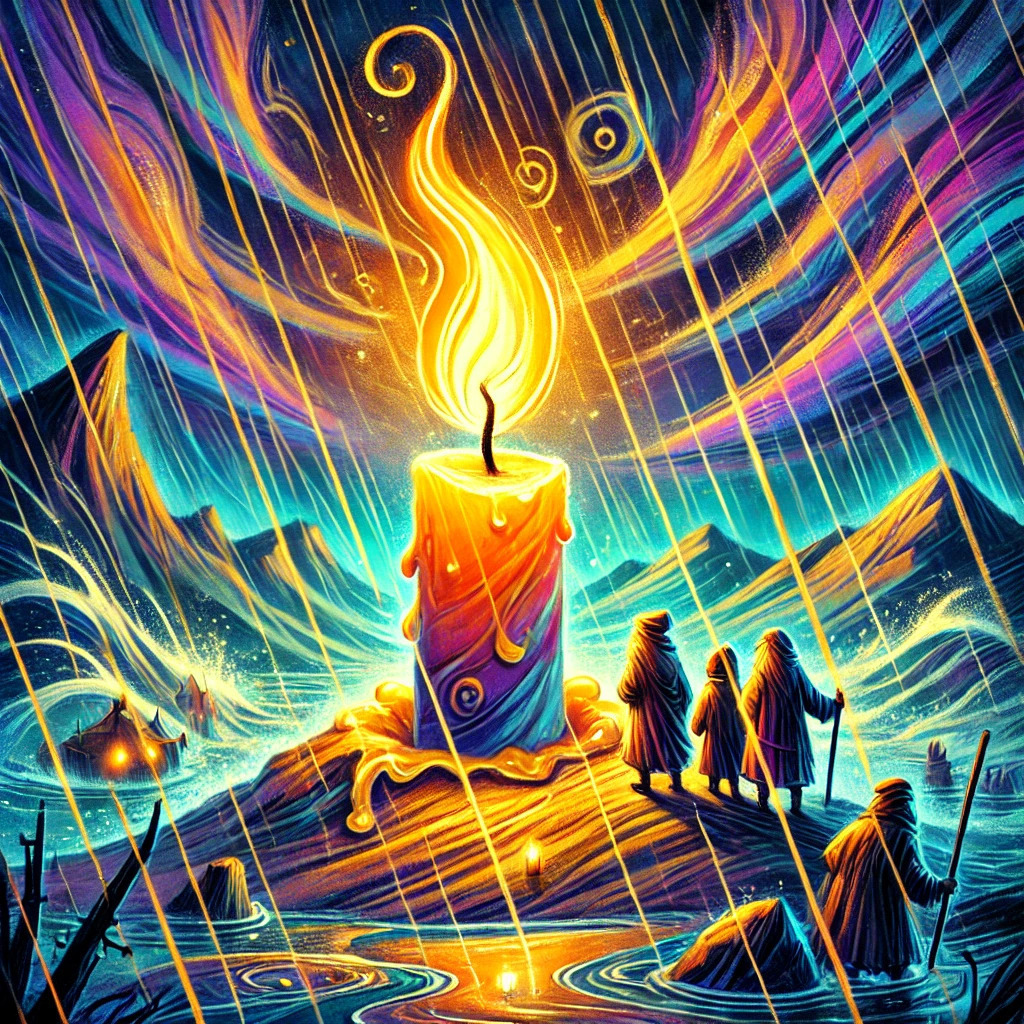
Moral:
Light, both real and in your heart, is stronger than fear.
Notes:
— Flickered — shone unsteadily, like a small flame (мерцала).
— Shadow — a dark shape made when light is blocked (тень).
— Creept — moved slowly and quietly (подкралась).
— Defeat — win against something or someone (победить).
The Lantern That Showed the Way (Фонарь, который указывал путь)
In a small fishing village on the northern coast of Norway, there was an ancient lantern that hung at the edge of the pier. It had guided sailors home for generations, glowing even in the thickest fog.
One winter night, a fierce storm rose, tossing the sea into chaos. A small fishing boat was lost in the darkness, its crew struggling to find their way back.
The lantern, seeing the danger, whispered to the wind, “Help me shine brighter. They need to see me!”
The wind laughed. “A lantern cannot change its light. You’re too small to fight a storm.”
But the lantern refused to dim. It burned hotter, using every drop of oil it had left. Its light cut through the storm like a blade. The sailors saw the glow and steered toward it, reaching the safety of the harbor.
By morning, the lantern was empty, its glass cracked from the heat. But the villagers repaired it, saying, “This lantern gave all it had to save our people. We’ll keep it burning for many more winters.”
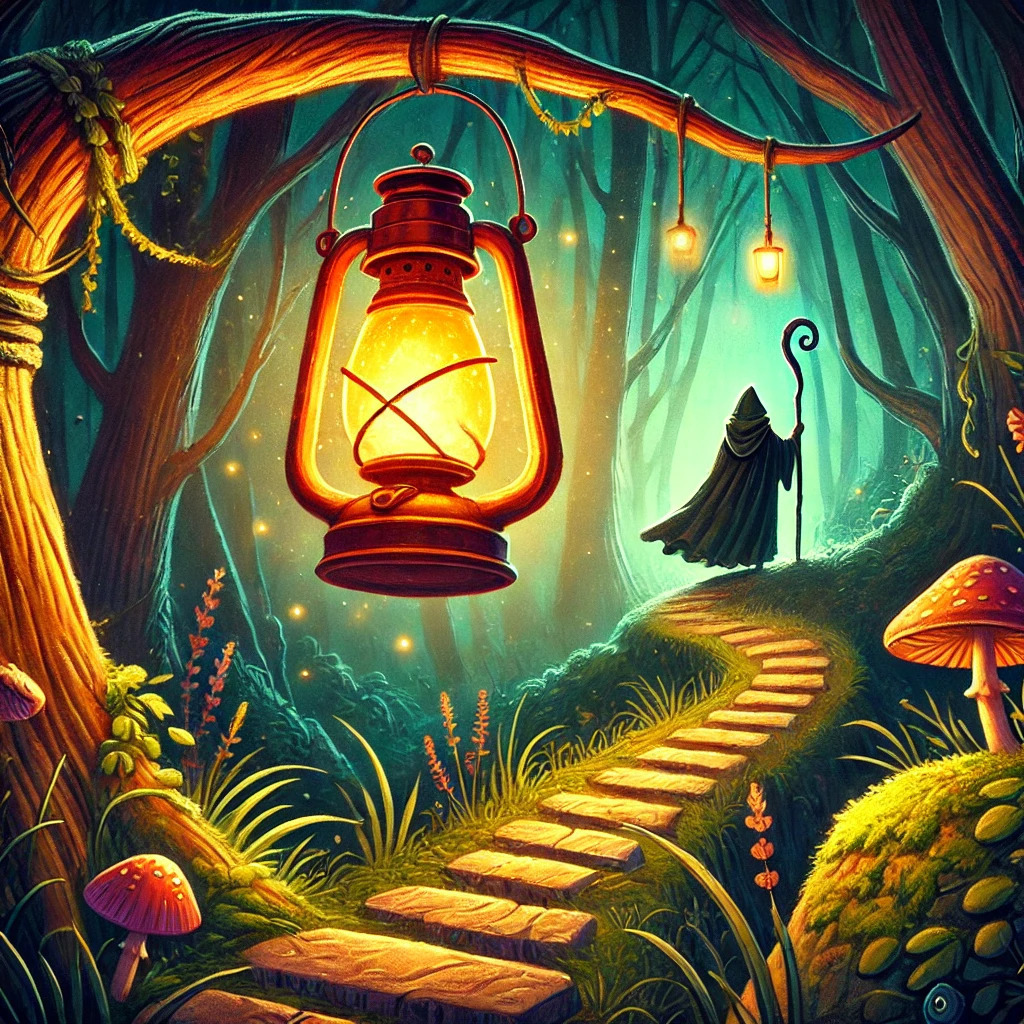
Moral:
Even the smallest light can guide others to safety.
Notes:
— Pier — a platform built over the water for boats (причал).
— Fierce — very strong or violent (яростный).
— Steered — turned or guided a boat or vehicle (управляли).
— Dim — not bright (тусклый).
The Bridge That Refused to Fall (Мост, который отказался рухнуть)
High in the Himalayas, there was an ancient wooden bridge that connected two mountain villages. Over the years, it had carried traders, pilgrims, and travelers through wind, snow, and rain.
One summer, heavy rains brought floods that roared through the valley. The villagers worried, “The bridge will break! We’ll be cut off forever.”
The bridge felt the water pounding against its supports but held firm. It whispered to the river, “I will not fall. Too many lives depend on me.”
The river surged higher, laughing, “You’re just wood and rope. You can’t stop me!”
But the bridge tightened every knot and clung to the rocks with all its strength. By morning, the floods receded, and the bridge stood tall, though its ropes were frayed and its planks cracked.
The villagers repaired it and hung prayer flags along its sides, thanking the bridge for its bravery.
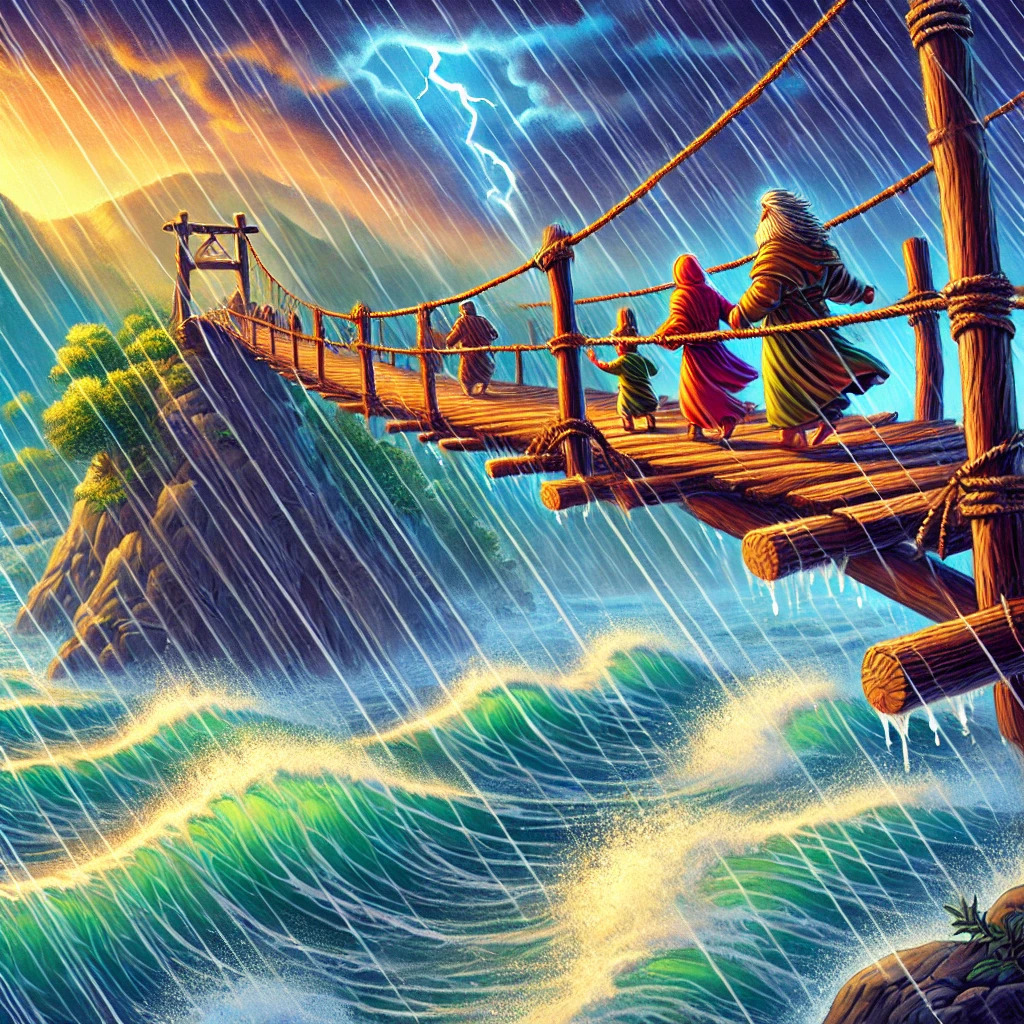
Moral:
True strength lies in enduring for the sake of others.
Notes:
— Trader — a person who buys and sells goods (торговец).
— Pilgrim — someone who travels for religious reasons (паломник).
— Frayed — worn or unraveling (истёртый).
— Recided — moved back or became less strong (отступила).
The Dragon Who Guarded the Plum Blossom (Дракон, который охранял сливовый цветок)
In a quiet valley in China, a single plum tree grew on a rocky cliff. This tree was special — it bloomed even in the harshest winters, its blossoms white as snow. A golden dragon, Ling, guarded it, for legend said its blossoms held the secret to eternal hope.
One year, a powerful warlord came to the valley, demanding, “Give me the tree, or I will burn this land!”
The villagers pleaded with Ling, “What can you do against such power?”
Ling replied, “I will not let greed destroy hope.”
When the warlord’s army arrived, Ling flew into the sky, his golden scales blinding the soldiers. He roared, shaking the mountains, and created a storm that drove the army away.
The warlord fled, and the villagers gathered around the plum tree, which now bloomed brighter than ever. They whispered, “Hope grows strongest when it’s protected by courage.”

Moral:
Courage protects what is most precious.
Notes:
— Warlord — a military leader who rules by force (военачальник).
— Blinding — so bright it’s hard to see (ослепительный).
— Scales — the small, hard plates covering a dragon or fish (чешуя).
— Greed — wanting too much, especially of something valuable (жадность).
The Song of the Arctic Owl (Песня арктической совы)
Far above the Arctic Circle, where the nights last for months, lived a snowy owl named Salla. Her voice was deep and beautiful, but she rarely sang.
One long winter, the polar bears grew restless, the seals hid under the ice, and even the foxes stopped playing. The silence weighed heavily on the land.
Salla perched on a high rock and thought, What can I do to bring life back to this frozen world?
She opened her beak and sang. Her voice echoed over the icy plains, reaching every creature. The bears stopped pacing, the seals surfaced to listen, and the foxes came out to dance.
The animals gathered under Salla’s perch, their hearts warmed by her song.
From that day, whenever the Arctic grew too quiet, the creatures would say, “Sing for us, Salla. Remind us that even in the darkest winters, beauty can be found.”
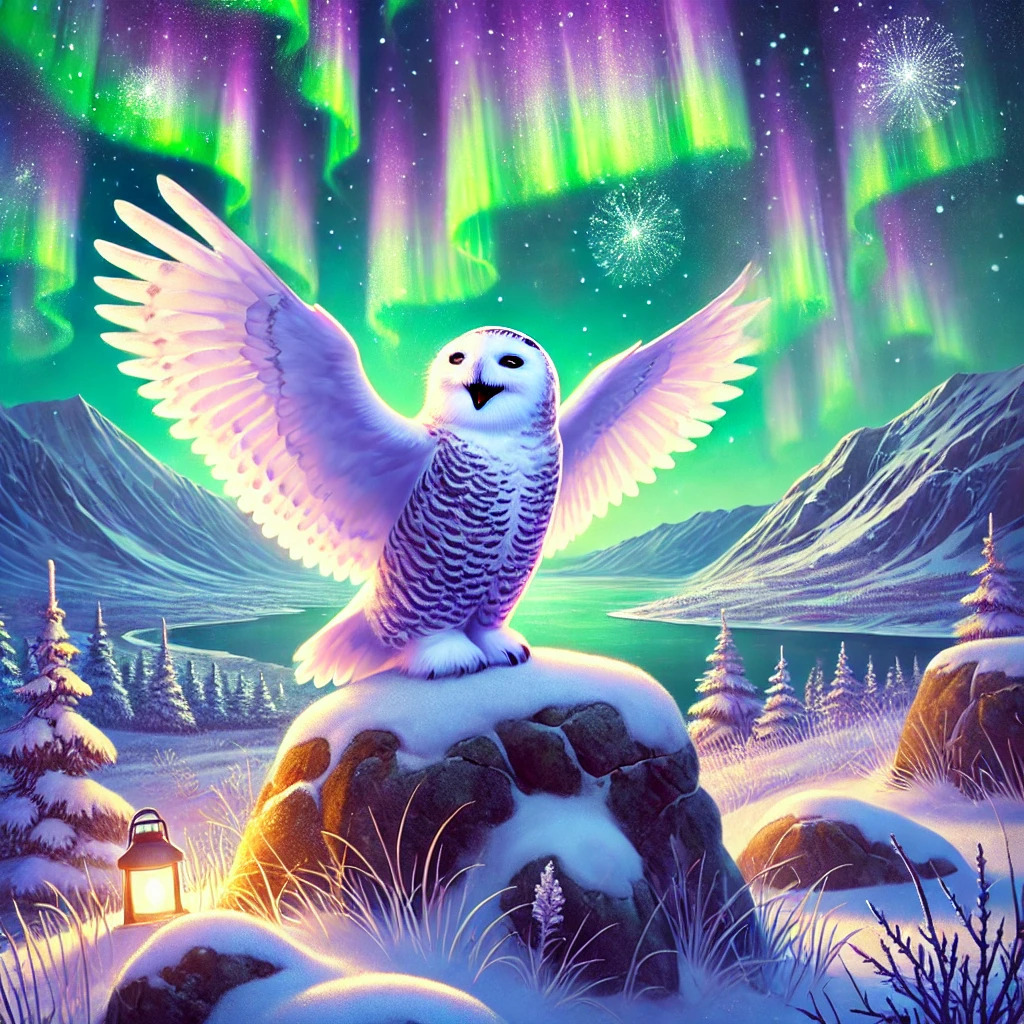
Moral:
In the darkest times, beauty brings hope.
Notes:
— Perched — sat or rested on something high (сидела на высоте).
— Restless — unable to stay still or calm (беспокойный).
— Echoed — repeated a sound as it bounced back (эхо разнеслось).
— Surfaced — came to the top of the water (всплыли).
The Clockmaker and the Broken Time (Часовщик и сломанное время)
In a small Bavarian village, there lived a clockmaker named Otto. He was famous for his beautiful cuckoo clocks, each one a masterpiece. But one day, the largest clock in the town square broke. Its hands stopped moving, and the cuckoo refused to sing.
The villagers panicked. “Without the clock, how will we know when to open the market or ring the church bells?”
Otto examined the clock and found the problem: the main spring was cracked. But no matter how hard he searched, he couldn’t find a replacement.
One night, Otto sat alone in his workshop, staring at the broken spring. Suddenly, a tiny voice called out, “Use me.”
He looked down and saw a small, bent nail on his workbench. “You? You’re too weak to hold such a great clock together!”
The nail replied, “Perhaps. But you won’t know unless you try.”
Otto hesitated but placed the nail where the spring had been. When he wound the clock, it ticked! Slowly, the hands began to move, and the cuckoo sang once more.
The villagers cheered as Otto announced, “Sometimes, even the smallest things can fix the biggest problems.”
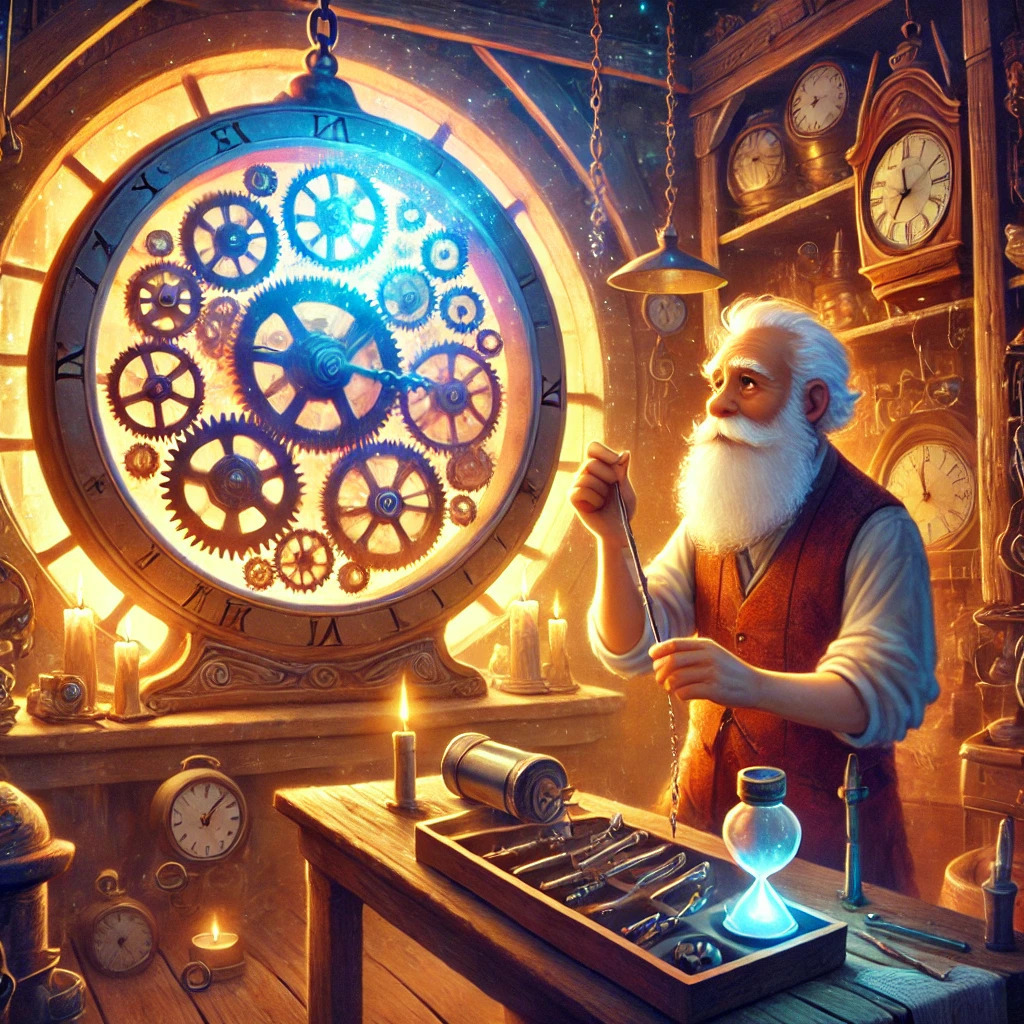
Moral:
Never underestimate the power of small solutions.
Notes:
— Masterpiece — a work of outstanding skill or art (шедевр).
— Spring — a coiled piece of metal that powers a clock (пружина).
— Workbench — a sturdy table used for working on projects (рабочий стол).
— Ticked — made the regular sound of a working clock (тикал).
The Bridge of a Thousand Lanterns (Мост тысячи фонарей)
In an ancient Japanese village, there was a long bridge that stretched over a wide river. Every year during the Lantern Festival, the villagers lit the bridge with a thousand glowing lanterns to honor their ancestors.
One year, a powerful typhoon destroyed the bridge, leaving the villagers heartbroken. “Without the bridge, how can we honor the spirits?” they cried.
A young girl named Hana stepped forward. “We can still honor them,” she said. “Let’s each make a small raft and place our lanterns on the water.”
At first, the villagers doubted her idea. But one by one, they followed Hana’s example, placing their lanterns on tiny wooden rafts.
That night, the river shone with a thousand lights, drifting peacefully downstream. The villagers watched in awe as the lanterns seemed to dance, creating a path of light that stretched farther than the bridge ever had.
From that year on, the river became the new home for the Lantern Festival.

Moral:
When one path is lost, another can be created.
Notes:
— Lantern — a portable light often made of paper (фонарь).
— Typhoon — a tropical storm (тайфун).
— Raft — a flat structure for floating on water (плот).
— Drifting — moving slowly with the current (плывущий по течению).
The Iceberg That Dreamed of the Tropics (Айсберг, который мечтал о тропиках)
Far in the Arctic, an iceberg named Kira floated among her icy siblings. She dreamed of warmth and color, imagining lush green forests and golden beaches.
One day, a strong current pulled Kira southward. The other icebergs warned her, “You’ll melt and disappear if you leave!”
But Kira replied, “I want to see the world, even if it means I won’t stay the same.”
As she drifted into warmer waters, Kira began to shrink. She felt lighter, freer, as pieces of her fell away and joined the ocean.
Eventually, she became so small that she could no longer float as an iceberg. Instead, she became part of the sea, traveling with the waves to places she had only dreamed of.
Even as she disappeared, her spirit lived on in the rain, rivers, and streams, bringing life to the tropics she had once imagined.

Moral:
Sometimes, fulfilling your dreams means embracing change.
Notes:
— Iceberg — a large piece of floating ice (айсберг).
— Current — the movement of water in the ocean (течение).
— Shrink — to become smaller (уменьшаться).
— Tropics — warm regions near the equator (тропики).
The Tree That Held the Mountain (Дерево, которое удержало гору)
In the rugged Carpathian Mountains, a great oak tree grew on a steep hillside. Its roots clung tightly to the soil, holding the mountain steady.
One spring, heavy rains soaked the ground, and the hillside began to crumble. Rocks tumbled, streams turned into rushing rivers, and the villagers below feared a landslide.
The oak, feeling the earth shift, whispered to its roots, “Hold tighter. The mountain needs us.”
The smaller trees around it panicked. “We’re too small! We’ll be swept away!”
The oak replied, “Together, we are stronger. Dig deeper. We can save the mountain.”
The trees followed the oak’s advice, their roots intertwining with its. Together, they stopped the earth from sliding, saving the village below.
The villagers, seeing the oak’s strength, called it “The Guardian Tree” and protected the forest for generations.

Moral:
Even the strongest need others to stand firm.
Notes:
— Rugged — rough and uneven (скалистый, неровный).
— Crumble — to break apart into small pieces (разрушаться).
— Landslide — when a large amount of earth or rocks falls down a slope (оползень).
— Intertwining — twisting together (переплетающиеся).
The Cloud That Became a Mountain (Облако, которое стало горой)
Above the wide plains of Mongolia, a lonely cloud drifted in the endless sky. She longed to be like the mountains below, solid and majestic, watching the world from the same place every day.
One day, the wind asked her, “Why are you so sad, little cloud?”
“I want to be a mountain,” she replied.
The wind thought for a moment. “If that’s your wish, I can help. But it won’t be easy.”
The wind blew the cloud over the dry plains, where her drops of rain fell to the earth. Over time, grass grew, then trees, and finally, animals came to live there.
The cloud continued to give herself to the land, drop by drop, until one day, she was gone. In her place rose a great hill, covered in green and alive with life.
The wind whispered, “You didn’t just become a mountain. You gave life to the world.”

Moral:
True greatness comes from giving, not taking.
Notes:
— Drifted — moved slowly with the wind (плыла по ветру).
— Majestic — very beautiful and impressive (величественный).
— Plains — large, flat areas of land (равнины).
— Drop by drop — slowly, one bit at a time (по капле).
The Phoenix Who Forgot How to Rise (Феникс, который забыл, как возродиться)
In a distant desert, a phoenix named Ashara lived in a nest of embers. Every hundred years, she would burst into flames and rise again, reborn.
But one day, after a long and tiring century, Ashara felt doubt. “What if I don’t rise this time?” she thought. “What if I disappear forever?”
When the time came, the flames engulfed her, but she hesitated, afraid to spread her wings. Her ashes remained still.
The desert wind, seeing her fear, whispered, “Ashara, the fire doesn’t destroy you. It makes you whole. Trust it.”
Summoning her courage, Ashara stretched her wings. The fire embraced her, lifting her into the sky, brighter and stronger than ever.
From that day on, she remembered: the fire wasn’t something to fear but a part of her journey.

Moral:
Fear of change can hold you back, but embracing it makes you stronger.
Notes:
— Embers — glowing pieces of wood or coal from a fire (тлеющие угли).
— Engulfed — completely surrounded or covered (поглотил).
— Hesitated — paused before acting (задержалась, колебалась).
— Whole — complete, not broken (целая).
The Bell Tower That Found Its Voice (Колокольня, которая нашла свой голос)
In a quiet Swiss village, there was a bell tower with no bell. The villagers said it was cursed, for every bell placed inside cracked before it could ring.
One day, a wandering blacksmith passed through the village. He listened to the villagers’ complaints and said, “The problem isn’t the tower or the bells. It’s the silence in your hearts.”
The villagers scoffed. “What do you know?”
The blacksmith climbed the tower and placed a simple iron bell he had forged himself. It was plain and unpolished, unlike the grand bells before it.
When he rang the bell, its sound was soft but clear, echoing across the valley. The villagers stood in silence, their eyes wide.
“The bell rings because it carries your hopes, not your pride,” the blacksmith said. From then on, the bell tower rang every day, reminding the village of the beauty in simplicity.
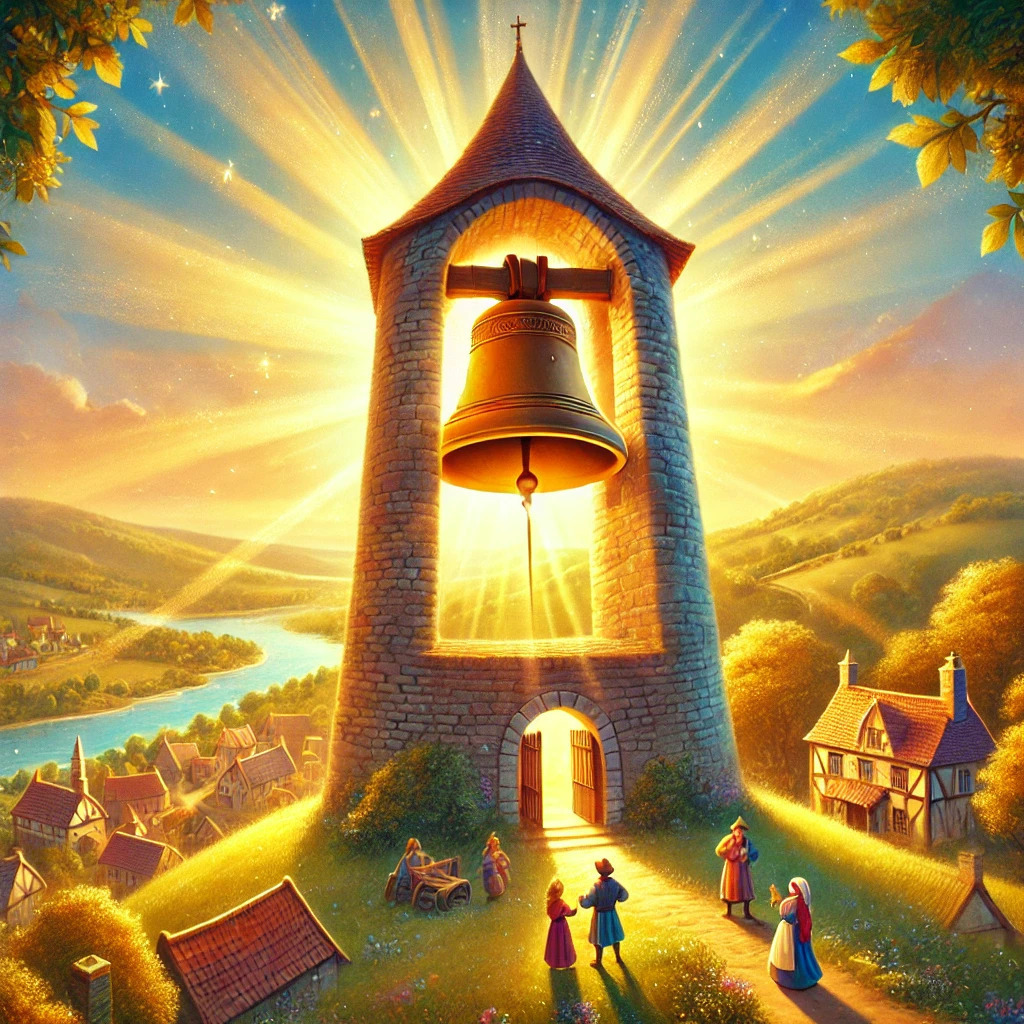
Moral:
True strength comes from humility, not grandeur.
Notes:
— Cursed — said to have bad luck or a magical problem (проклятый).
— Blacksmith — someone who makes things from metal (кузнец).
— Scoffed — mocked or laughed at in disbelief (насмехались).
— Humility — the quality of being humble, not proud (скромность).
The Stone That Wanted to Roll (Камень, который хотел катиться)
In the Scottish Highlands, a small gray stone lay on a hillside, surrounded by moss and heather. It had been there for centuries, unmoving, watching the world change.
One day, the stone whispered to the wind, “I want to roll. I want to see the valleys and rivers below.”
The wind chuckled, “You’re too small and heavy. Stones like you don’t move.”
But the stone was determined. Over time, rain softened the earth around it, and a strong gust of wind finally pushed it free. The stone tumbled down the hill, bouncing over rocks and streams.
At first, it was exhilarating. The stone felt alive. But as it reached the valley, it realized it had lost its smooth surface and had been chipped by the journey.
“Now I’m broken,” the stone sighed.
“No,” said the river it landed in. “You’ve changed, but you’ve also grown. Your rough edges tell the story of where you’ve been.”
The stone settled in the river, its journey complete. It was no longer the same, but it had found a new home.

Moral:
Change may leave marks, but it also creates stories.
Notes:
— Moss — soft, green plant that grows on rocks or trees (мох).
— Heather — a purple-flowering plant found in the Highlands (вереск).
— Exhilarating — very exciting (волнующий).
— Chipped — broken or cracked in small pieces (отколотый).
The Snow Fox and the Northern Lights (Снежная лиса и северное сияние)
In the snowy forests of Finland, a white fox named Lumi roamed under the dark winter sky. She loved the silence of the snow but often wished for something more — a sign that the world was bigger than her forest.
One cold night, Lumi noticed a flicker of color in the sky. It was faint at first, but soon waves of green and purple light began to dance above her.
“What is this magic?” she whispered.
The wind answered, “It’s the northern lights. They appear for those who are patient enough to see them.”
Lumi followed the lights across frozen lakes and snowy hills. As she ran, the colors seemed to guide her. By dawn, she reached the edge of a vast fjord, where the sky met the sea.
The fox realized she didn’t need to leave her world to find magic — it was already there, waiting for her to notice.
Бесплатный фрагмент закончился.
Купите книгу, чтобы продолжить чтение.